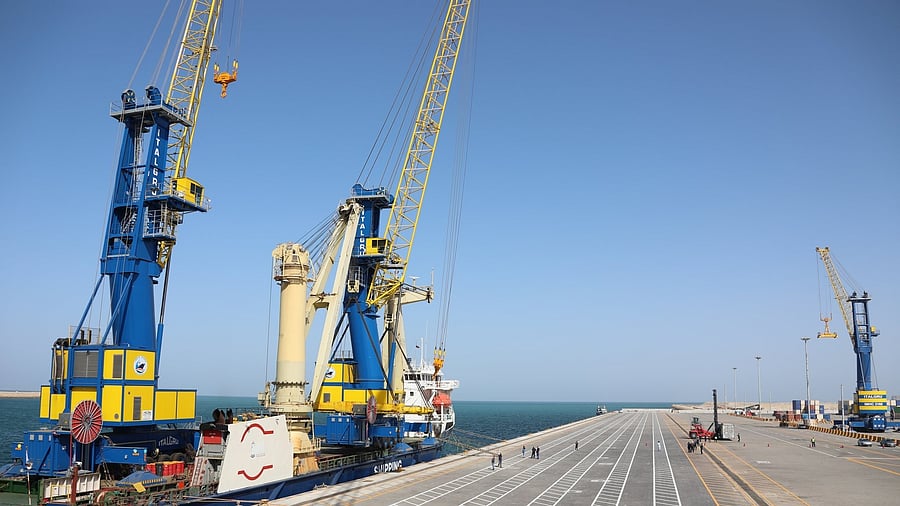
A view of the Chabahar port
Credit: X/@PIB_India
On May 13, the secretary of Armenia’s Security Council paid a quiet visit to India, where he met with his Indian counterpart, National Security Adviser Ajit Doval. Topping the agenda was India's just-concluded Operation Sindoor. Soon after, Doval had a telephone conversation with his Iranian counterpart. Iran and Saudi Arabia were the only two countries that had engaged in heightened diplomacy when India launched Operation Sindoor. Iran’s foreign minister Abbas Araghchi visited both New Delhi and Islamabad to seek ways for de-escalation.
Armenia and Iran have emerged as crucial for New Delhi to counter the Islamabad-Baku-Ankara axis, something that Operation Sindoor laid bare. A strategic approach requires trilateral co-operation between New Delhi, Tehran, and Yerevan.
India and Armenia have established a defence partnership since 2020. To date, Armenia is not known to have used any Indian-supplied weapons in its conflict with Azerbaijan in 2020 over the contested territory of Nagorno-Karabakh, or the border skirmishes in 2022. However, Baku has been vocal about its dissatisfaction with India’s weapons supplies to Armenia. Some of these supplies, it is understood, have been transported to Armenia through Iran. Trilateral co-operation is, thus, already a fact, as attested by the establishment of the trilateral consultation mechanism.
More importantly, this trilateral co-operation is necessary for keeping crucial trade routes and transport corridors open.
Both Armenia and Azerbaijan are currently negotiating a peace treaty, following Azerbaijan's victory in the Karabakh war, mainly due to Turkish weapons and military counsellors. Azerbaijan wants to negotiate with Armenia from a position of strength, and frowns at India's defence co-operation with Armenia. However, with a defence budget thrice as big as Armenia's, Azerbaijan continues to strengthen its military arsenal with procurement from Turkiye, Pakistan, and Israel.
At the heart of this angst lies Ankara and Baku's push for the ‘Zangezur Corridor’, a land route that should connect Azerbaijan to its autonomous exclave of Nakhichevan, separated from it by Armenia. Nakhichevan borders Turkiye and land access to it would give Baku direct land access to Turkiye and Europe.
The 2020 agreement between Armenia and Azerbaijan provided Azerbaijan with land access to Nakhichevan. While Armenia interprets this as opening road access, Azerbaijan wants it to be a ‘corridor’ without any Armenian customs or border control. It cuts through Armenia’s southernmost province of Syunik, which borders Iran’s Azeri province in the north.
Azerbaijan has been pushing for this corridor for some time now, and after its victory in Karabakh it has at various times threatened to establish the corridor by force, if necessary.
During his 2020 visit to Nagorno-Karabakh after the war, Turkish President Recep Tayyip Erdogan said the corridor was a "strategic issue" for Türkiye, and was "very important" for ties between Ankara and Baku. The corridor would give Türkiye direct land access to Azerbaijan, Iran, and further to the Caspian Sea and the Central Asian countries, connecting to the Middle Corridor. This would allow it to exponentially increase its presence and influence in the region. It must be remembered that Turkiye is against the India-Middle East-Europe Economic Corridor (IMEC) as it envisages itself as an energy and transport hub in the region.
Iran is opposed to the ‘Zangezur Corridor’, because, if implemented, it can cut off Iran’s access to Armenia, and further to Europe. It is also here that Azerbaijani irredentist claims on Iran’s Azerbaijan region can be actualised. While both Tehran and Baku have been trying to improve ties, Tehran's position on the corridor remains unwavering.
On May 21, Iran’s defence minister Brigadier-General Aziz Nasirzadeh, who was on a visit to Yerevan, said that the common border between Iran and Armenia is a historical communication route, and Tehran will not allow any encroachment on this border.
In the current geopolitical context, it is imperative for India to support this position. India's investment in the Chabahar port and in Armenia offers it the shortest multimodal route to the Black Sea and Europe, bypassing the conflict-plagued Suez Canal. Actualisation of the Zangezur Corridor as it is currently envisaged has the potential to disrupt this.
At a time when Turkiye and Azerbaijan are assertively expanding their presence in South Asia, India needs to counter it with its presence in the South Caucasus. That would require upholding the territorial integrity of countries in the region.
(Aditi Bhaduri, a political analyst, specialises in Eurasian affairs. X: @aditijan.)
Disclaimer: The views expressed above are the author's own. They do not necessarily reflect the views of DH.